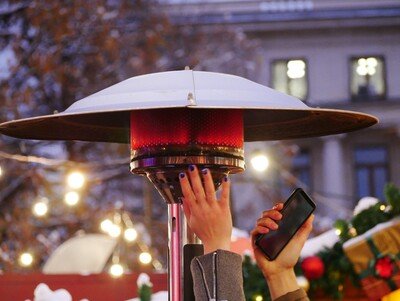Patio heaters enhance our outdoor experience and extend our outdoor hours significantly. However, these carefree hours may quickly turn into worrisome experiences when you start to pick up strange noises – which sometimes may become seemingly loud! Should patio heaters be noisy or quiet? What is normal?
Patio heaters should be quiet. A noise of fewer than 30 decibels (dB) is typical. When patio heaters become louder than 30dB, it should be investigated. Different style patio heaters make different kinds of noise. Such as, the pyramid shape is slightly louder than the top-hat style.
In this article, we’re looking at loud patio heaters. When are they noisy? Do the noise levels relate to the proper operation or the “something seems wrong” sound? If your patio heater is not quiet enough for your taste, you may be on the verge of discovering why it is so loud by continuing below.
How Loud Is Loud? What is considered too loud?
Noise levels are measured in decibels (dB). What are normal dB levels?
A noise level of 30 dB is similar to a whispered conversation or the rustling leaves around your patio area. Inside your home, the average noise level is likely to rise to around 40 dB, with some appliances exceeding that (e.g., the average dishwasher is 60 dB).
This should give you a general frame of reference against how you may assess your patio heater’s noise level. Bear in mind that – should it approach the noise level of your vacuum cleaner (75 dB), you are near the danger zone: noise above 85 dB is harmful.
When your patio heater makes a noise comparable to a lawnmower (90-95 dB), a motorcycle, or a boom box (both 90-100 dB), you know that you are in trouble!
Let’s get real, though. A patio heater that starts being louder than normal conversation needs attention!
Typical Problem Noises Of Patio Heaters And Their Related Probable Fix.
- Hissing sound: If the propane or natural gas supply to the patio heater is not flowing correctly, it may produce a hissing sound. What to Do: Try tapping the regulator and or realign the flame and gas exiting nozzle.
- Fluttering sound: If the patio heater’s propane or natural gas supply is burning away from its exit nozzle. What to Do: turn off, relight, and adjust the flame to be suitable for any breeze.
- Popping or cracking sound: If the patio heater is not clean, it could accumulate debris or corrosion, which could apply heat to areas not designed for being heated. This lead to popping or cracking sounds. What to Do: Turn it off, try reigniting, and if it persists, clean the ignition/ flame area.
- Rattling sound: Loose components or fasteners in the patio heater may cause rattling or clanking sounds. What to Do: Turn off, and check for loose covers and shields.
- Whistling sound: A clogged or improperly adjusted gas regulator or nozzle may cause a whistling sound. What to Do: tap the regulator a few times to see if it changes, and check the outlet nozzle for restrictions.
- Screeching sound: A forced air patio heater’s motor is malfunctioning. It could produce a screeching or grinding sound. What to Do: check for motor bearing lubrication ports; if none, replace the motor.
It’s important to note that these sounds are not necessarily typical for a properly functioning patio heater. If you hear any unusual noises from your patio heater, you should have it inspected and repaired by a qualified technician.
What Kinds of Noise do Patio Heaters Make?
The different types of patio heaters make different sounds. First, let us run through the most common types of patio heaters: the electric patio heater, the propane patio heater, and the gas patio heater (the infrared patio heater is unlikely to make a noise).

WHAT You Should HEAR at a normal distance away
- Top-hat style propane patio heater – No sound to a light hiss and or subtle roar.
- Pyramid-style patio heater – Nothing, maybe some flutter from the dancing flames.
- Infrared electric patio heater – Nothing, to a slight electrical hum. Sound of metal expanding when warming up.
- Forced air outdoor heater – the combustion sound and the motor/ fan running.
Let us get a little more detailed.
Possible Noise Of An Electric Patio Heaters
Infrared electric patio heaters, or types without a fan, are the quietest type of patio heater and should make virtually no sound (less than 30 dB, about the sound of rustling tree leaves near your patio!). A gentle, light hum is normal.
Heaters with a fan: If an electric patio heater is noisy, it will likely be one of three problems: the fan or the motor. Or a louder hum caused by a drop in voltage.
Noise caused by the fan:
- The first possibility is that the fan is unstable a rattling or clanging sound. If you hear this type of sound, it is a “something is wrong” sound. Thus, it typically means the fan blades are hitting something as they spin.
- Another reason for the fan causing noise is that the fan may be clogged. Just clean the air intake area of the fan.
- Yet another sound may be found in older units, where the fan’s bearings have worn or dried out. The solution is to replace the fan unit.
- The more common problem is a faulty motor. The most likely noise here is a screeching or whining sound caused by a lack of lubrication or worn-out bearings.
Noise caused by a drop in voltage:
- When the voltage drops, the amp draw or electricity demand is higher. This causes a louder electric hum sound. If it is very loud, you should turn off the heater until the voltage returns to normal.
- This is usually normal and within reason if a lot is running. However, extreme drops (often called brownouts) can blow the heaters’ elements because the amperage has increased above its designed use.

Need to test your voltage? Here is a great little tester kit to use any where around your home: Klein Tools 69149P Electrical Test Kit
Noise Of Propane Patio Heaters
The propane patio heater also has an operating noise level of less than 30 dB (less than rustling leaves or a whispered conversation).
Overuse and aging can cause your propane heater to make noises. These noises may come from the propane tank to the gas flame area.
- Clogged gas regulator or nozzle: If the gas regulator or nozzle is clogged, it may cause the gas to flow unevenly or create turbulence in the gas stream, leading to a whistling sound.
- Malfunctioning gas valve: If the gas valve is not functioning correctly, it may cause gas to flow too quickly or too slowly, which could create a whistling sound.
- Gas pressure too high: If the gas pressure is too high, it may cause the gas to flow unevenly, leading to a whistling sound.
- Wind: If the wind is blowing strongly and at a certain angle, it may create a whistling sound as it passes over the top of the heater.
Other Outdoor Heaters For Patio Areas & Noise
The natural gas patio heater – the one connected to your home gas lines – may make clanging and banging noises as the metal housing, vents, pipes, and other parts heat up and cool down.
Industrial-style heaters, also known as “jet-Heaters” or “Torpedo heaters,” can use kerosene, diesel, propane, or natural gas. These are typically too noisy for a patio or deck environment. However, if you use one, the noise is the combustion and fan. These heaters are above 50 dB.
Each Heater Type, The Most Common Noise Related Problems?
- Propane: Dirty or clogged gas line, gas regulator.
- Infrared electric: Voltage drop
- Any fan-forced heater: Fan blades, motor bearings, and debris
- Natural gas: Dirty or clogged gas line, gas regulator
Need a gas regulator for your model heater? Check out these replacement units on Amazon
See this article on how to clean your patio heater How to Clean Your Patio Heater Thermocoupler
Conclusion
While expecting a quiet and efficient performance from your patio heater, you may have to deal with a few noise incidents during your lifetime – regardless of which type of patio heater you have.
Knowing what kinds of noise are associated with your type of patio heater, what noise levels are acceptable for it, and when to take action is beneficial. Anyone can undertake many of these actions, but it is much safer to have qualified, and experienced persons implement the solutions suggested in this article.
Most noises are easily avoided, as they are – without exception – maintenance-related. The moral of the story is just like any mechanical thing: If you want a quiet patio heater, one should maintain it properly!


